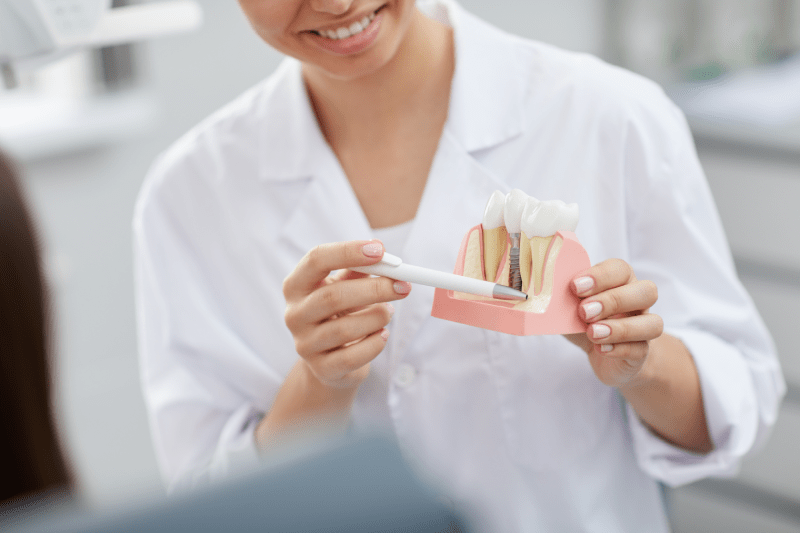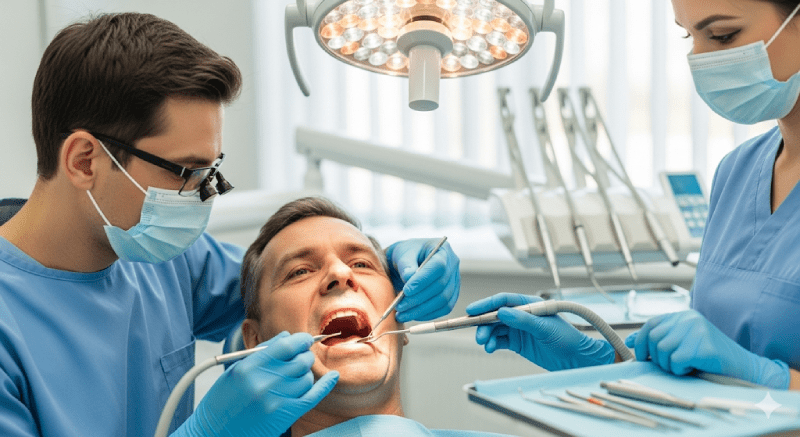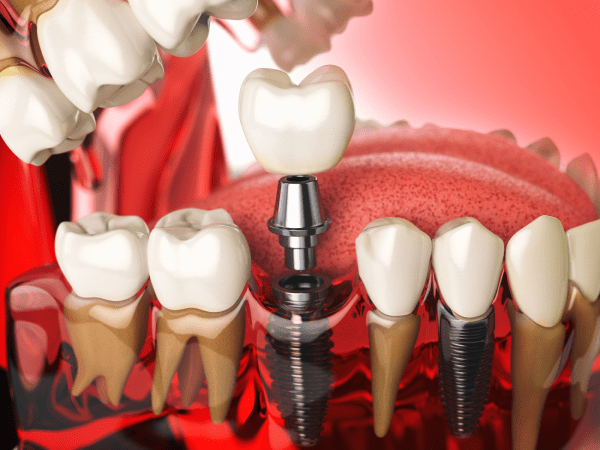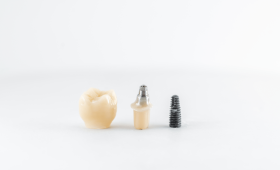What Exactly is a Dental Implant and How Does It Work?
A dental implant is a small, screw-shaped surgical structure made of titanium, a biocompatible metal, that mimics the root of a missing tooth. This artificial root is surgically placed into the jawbone, where it naturally fuses with the bone over time. This process is called osseointegration, and it allows the implant to become a permanent and stable part of the jawbone.
Once osseointegration is complete, a connecting piece called an abutment is attached to the implant. In the final stage, a custom-made crown (artificial tooth) that perfectly replicates the appearance and function of a natural tooth is placed on the abutment. With these three components combined, the patient regains a complete dental structure, both aesthetically and functionally. This treatment is a more durable and healthier solution than other alternatives (bridges or dentures), as it does not harm neighboring teeth and prevents jawbone loss.
Who is a Candidate for Dental Implant Treatment?
Dental implant treatment is an ideal option for adults who have lost one or more teeth, have healthy gum tissue, and sufficient jawbone density. One of the most important requirements to be a candidate is that jawbone development must be complete, which is why it is generally applied to individuals aged 18 and older. People in good general health are primary candidates.
However, the treatment may not be suitable for those with certain chronic conditions such as uncontrolled diabetes, severe heart conditions, or immune system diseases. Additionally, heavy smoking or alcohol consumption can negatively affect the healing process, so these habits should be reviewed before treatment. The suitability of a person for an implant is definitively determined by a detailed oral examination, panoramic X-ray, and 3D tomography performed by a dentist before starting treatment.
How Long Does Dental Implant Treatment Take?
The total duration of dental implant treatment varies depending on the patient’s individual situation and jawbone structure. The first and most critical stage of the process, which is the surgical placement of the implant into the jawbone, usually takes only 15-30 minutes and is performed under local anesthesia. Following this procedure, a waiting period for the implant to fuse with the bone (osseointegration) begins. This healing process can range from 2 to 6 months.
This waiting period allows the bone structure to strengthen and the implant to form a permanent foundation. Once osseointegration is complete, a second short procedure attaches the abutment to the implant, and finally, the crown is placed. If additional procedures like bone grafting or sinus lifting are required before the implant, the total treatment time may be extended.
How Does the Preparation Process Before a Dental Implant Work?
The preparation process before a dental implant is of vital importance for the success of the treatment. This process begins with a comprehensive oral examination by the dentist. During this examination, the patient’s general health history, oral hygiene habits, and any chronic conditions are evaluated. A panoramic X-ray or 3D dental tomography (CBCT) is then taken to get detailed information about the condition of the jawbone and the location of nerves and vessels.
These imaging techniques help in the precise planning of where and at what angle the implant will be placed. If bone density is insufficient or the sinus cavity is too close, additional surgical procedures such as bone grafting or sinus lifting may be necessary before starting the treatment. In the final stage of the preparation process, the dentist may perform preventative treatments like professional cleaning to minimize the risk of infection and maximize oral hygiene.
Is the Dental Implant Procedure Painful?
The implant placement procedure is definitely not painful thanks to modern anesthesia techniques. The local anesthesia applied before the procedure completely numbs the area, so the patient does not feel any pain or discomfort. Patients often report feeling only a slight pressure or vibration. The procedure can generally be perceived as being simpler than a tooth extraction or a filling.
After the anesthesia wears off, it is normal to experience some mild pain, swelling, or tenderness. However, these symptoms can be easily controlled with simple pain relievers prescribed by the dentist and the application of cold compresses. Patients can usually return to their daily routines within the first few days. Following the post-procedure instructions is crucial to having a comfortable and smooth healing process.

How Are Dental Implants Distinguished from Natural Teeth?
Thanks to modern technology and high-quality materials, the crowns placed on dental implants today are produced to be aesthetically very similar to natural teeth. The dentist customizes the color, shape, and even the surface texture of the crown to match the patient’s other teeth. Especially when aesthetic materials like zirconia are used, the light transmission of the crown is also close to that of a natural tooth.
This makes it difficult for both you and others to distinguish the implant from your natural teeth. A successful treatment not only provides an aesthetic solution but also gives a natural feel in terms of chewing function and speech ability. This is an indication that the implant has become a permanent and natural part of the oral structure, not just a prosthesis.
What is the Healing Process Like After a Dental Implant?
The healing process after a dental implant procedure usually begins with the first few days of mild swelling and tenderness. This is a normal reaction to a surgical procedure and can usually be controlled with cold compress application and non-steroidal anti-inflammatory drugs (NSAIDs) recommended by the dentist. During the healing period, it is crucial to keep the area clean and maintain maximum oral hygiene to reduce the risk of infection.
For the first few days, it is recommended to avoid hard and hot foods and to eat soft and lukewarm foods. The complete healing and osseointegration process of the implant with the jawbone generally takes 2 to 6 months. During this time, it is necessary to avoid putting pressure on the implant. If the patient has habits like smoking, it is strongly recommended to quit or reduce them as they can negatively affect the healing process.
What Should Be Considered After Dental Implant Treatment?
Proper post-treatment care is of great importance for the longevity and successful function of dental implants. First and foremost, you should maintain regular and meticulous oral hygiene, treating the implant like your own natural tooth. This includes brushing at least twice a day, using dental floss, and rinsing with mouthwash. Special brushes or tools can be used to clean the area around the implant and hard-to-reach spots.
Furthermore, regular dental check-ups are critical to monitor the condition of the implants and your overall oral health. During these check-ups, the dentist can detect potential problems early on and take the necessary actions. Lastly, avoiding chewing on overly hard foods like hard-shelled nuts and using a night guard against habits like teeth grinding or clenching will extend the life of the implant.
What Should Nutrition Be Like After Dental Implant Treatment?
The first 24 hours immediately following the dental implant procedure are very critical in terms of nutrition. During this time, to prevent increased bleeding and swelling, you should consume only soft and lukewarm/cold foods. Pureed soups, yogurt, pudding, ice cream, and mashed fruits are ideal options. Hot beverages and foods, alcohol, and spicy foods should be avoided completely.
After the first few days, you can gradually transition to more solid foods, but it is still important to stay away from hard, sticky, or difficult-to-chew foods. For example, foods like nuts or chips can harm the healing implant area. Once the osseointegration process is complete and the permanent crown is placed, patients can return to their normal eating habits. Since implants provide chewing power similar to natural teeth, it is possible to eat all kinds of food comfortably.
What Are the Potential Risks or Complications?
While dental implant treatment is a safe surgical procedure with a high success rate, there are potential risks and complications, as with any medical intervention. One of the most common risks is infection. Infection can develop if the surgical area is not sufficiently sterile or if the patient fails to follow hygiene rules.
Another risk is nerve damage, which can cause a loss of sensation or pain, especially with lower jaw implants. In procedures performed on the upper jaw, complications such as damage to the sinus cavity can occur. The most serious complication is the failure of the implant to fuse with the bone, leading to implant loss. This can be due to factors such as poor bone quality, smoking, or uncontrolled diabetes. However, these risks can be significantly reduced with a detailed pre-treatment examination, correct planning, an experienced dentist, and the patient’s adherence to post-treatment instructions.
Is Dental Implant Treatment Suitable for Children?
No, dental implant treatment is definitely not suitable for children. One of the most fundamental requirements for this treatment is that the patient’s jawbone development must be completely finished. In children and adolescents, the jawbones are still growing and changing shape. Once an implant is placed, it becomes a fixed part of the jawbone.
If an implant is placed while growth is still ongoing, it will remain stationary as the jawbone continues to grow, leading to aesthetic and functional problems by deviating from its correct alignment. This can cause crooked teeth or severe deformities in the oral structure. Therefore, dentists generally recommend waiting until 18 years of age or older, when jawbone development is complete. In exceptional cases, such as a tooth lost due to trauma, temporary solutions (dentures or bridges) are preferred, and implant treatment is postponed until the appropriate age.
What Should I Know About Implant Materials and Quality?
Dental implants are generally made from two main materials: titanium and zirconia. Titanium is the most widely used implant material due to its biocompatible properties (not rejected by the body) and exceptional durability. Titanium implants fuse perfectly with the bone, offering a long-lasting solution. Zirconia is another alternative material that has been gaining popularity in recent years. The biggest advantage of zirconia is its white, metal-free structure.
This provides a more natural look, especially for patients with aesthetic concerns, as there is no risk of the implant’s metal color showing through the gums. However, long-term data on the fusion and longevity of zirconia implants is not yet as extensive as with titanium. Choosing a quality implant brand is vital for the success of the treatment. Globally recognized brands, supported by scientific research and having been on the market for many years, tend to offer better results in terms of reliability and success.
What Are the Different Types of Dental Implants and Which is Right for Me?
Dental implants are fundamentally divided into two main categories: Endosteal (in-bone) and Subperiosteal (on-bone). The most common type used today and the one that provides the most successful results is the Endosteal implant. These implants are placed into the jawbone in the shape of a screw or cylinder. They are generally preferred for patients with a solid jawbone structure. Subperiosteal implants consist of a metal framework that rests on the bone surface and are rarely used in cases where bone density is insufficient or bone grafting cannot be performed.
In addition to these basic types, dentists can apply different treatment approaches depending on the number of missing teeth and the patient’s condition. For example, techniques like All-on-4 or All-on-6 allow for a full set of prosthetic teeth to be placed using only four or six implants for patients who have lost all their teeth. The most suitable type of implant for you will be determined by your dentist after a detailed analysis of your oral and jaw structure.

Why is Dental Implant Treatment so Popular in Turkey?
Turkey is a rapidly rising global destination for dental implant treatment, and there are several important reasons for this. The biggest attraction is that it offers high-quality treatment options at much more affordable prices compared to Western countries. Clinics in Turkey have made significant investments in modern technology and state-of-the-art equipment. These clinics are home to experienced and expert dentists who provide services at international standards and use leading global implant brands.
Additionally, Turkey’s geographical location, natural and historical riches offer the opportunity to combine the treatment process with an enjoyable tourist trip. Patients can explore the magical atmosphere of Cappadocia, relax on the beaches of Antalya, or take a cultural journey through Istanbul’s historic peninsula during their treatment. These advantages make Turkey an attractive hub for health tourism.
What Do Dental Implant Packages in Turkey Include?
Clinics in Turkey offer comprehensive dental implant packages, especially to simplify the entire process for patients coming from abroad. These packages generally include the main treatment costs, including the implant itself, the abutment (connecting piece), and the crown (artificial tooth). Other services included in the package may be the initial examination, panoramic X-ray or 3D tomography, and anesthesia used during the procedure.
Some more comprehensive packages may also include the patient’s travel and accommodation arrangements. For example, airport transfers, accommodation near the clinic, and guided tours to explore the city before or after treatment can be part of these packages. The goal of these packages is to make the entire process simple, transparent, and seamless for the patient. Before purchasing a package, it is crucial to find out in detail what is included and what is extra.
How Do Dental Implant Packages Differ from Traditional Treatments?
Dental implant packages differ significantly from traditional a-la-carte treatment methods and generally offer a more affordable and transparent cost structure. While in traditional treatments each service (examination, X-ray, implant, abutment, crown, etc.) is priced separately, packages combine most of these services under a single price. This makes it easier to budget, especially for patients from abroad, and reduces the risk of encountering unexpected costs.
Additionally, since the packages can include not only medical services but also logistical services like travel, accommodation, and transfers, they allow patients to manage the entire process in a more comfortable and organized way. Packages are designed to offer an integrated treatment experience that considers all the patient’s needs. This allows patients to focus on their treatment and complete the process without stress.
How Are Travel and Accommodation Arrangements Made for Turkey?
For patients considering traveling to Turkey for dental implant treatment, the process is quite streamlined. Many Turkish dental clinics have special “health tourism” units or partner agencies that work with international patients. These agencies can assist you with all logistical arrangements, from flight ticket reservations to hotel accommodation and airport transfers. These services may be included in the package or offered for an extra fee.
The agencies can also help you plan your accommodation and transportation according to your treatment schedule and tourist interests. These services make it much easier and more comfortable for patients, especially those traveling to Turkey for the first time, to manage the process. When you first contact the clinic, it is important to get detailed information about the services they can offer you in this regard.
What Services Are Included and Not Included in Package Prices?
The services included and not included in the prices of dental implant packages can vary depending on the scope of the package and the clinic’s policy. The basic services usually included in the package are the main components such as the implant itself, the abutment, and the crown. In addition, fundamental costs related to the procedure like the initial examination, X-ray, and anesthesia are generally included in the price. However, there are services that are not included in the package and may require an additional cost.
For example, surgical interventions such as bone grafting, sinus lifting, or additional tooth extractions required in cases of insufficient bone density may be subject to an extra charge. Furthermore, travel expenses (flight tickets), accommodation, and personal expenses (food, shopping, tourist trips) are generally not included in the package, although some special “all-inclusive” packages may offer these services. Before starting treatment, it is of vital importance to get a clear list of all services and possible additional costs to plan your budget correctly.
What is the Success Rate and Lifespan of Implants?
The overall success rate of dental implant treatment is quite high worldwide. When modern techniques and high-quality materials are used, the success rate can reach up to 95% to 98%. This high success rate depends on proper patient selection, an experienced surgeon, and the patient’s adherence to post-treatment care rules. Once titanium implants have fused perfectly with the bone, they have the potential to stay in the mouth for a lifetime.
However, this does not mean that the implants will remain problem-free forever. The crowns placed on top of the implants may need to be replaced within 5 to 15 years due to normal wear and tear. Factors such as gum disease or poor oral hygiene can negatively affect the health of the bone and gum tissue around the implant and lead to implant loss. Therefore, regular dental check-ups and daily oral care are very important to extend the life of the implant.
How Can I Choose Clinics and Doctors in Turkey?
Choosing the right clinic and doctor for dental implant treatment in Turkey is one of the most important steps for the success of the treatment. There are certain criteria you should pay attention to in this process. First, research the dentist’s experience and area of expertise. It is better to choose doctors who specialize in oral, dental, and maxillofacial surgery, as this ensures successful outcomes even in more complex cases.
You should also pay attention to the clinic’s use of technology and hygiene standards; modern equipment and a sterile environment minimize the risk of infection. Reading reviews and testimonials from previous patients can help you get an idea of the clinic’s quality. Lastly, choosing a clinic that offers international patient services, has open communication channels, and openly shares the pricing and treatment plan with you will make you feel more secure throughout the entire process.

Is a Communication Barrier Created During the Treatment Process?
Since Turkey is a popular health tourism destination for dental implant treatment, the risk of a communication barrier in clinics and health agencies is quite low. Many large clinics and hospitals employ staff who speak languages such as English, German, French, Russian, and Arabic to communicate comfortably with foreign patients.
Some clinics even have special patient coordinators to communicate with patients in their native language. These coordinators not only provide information about the treatment process but also guide the patient on matters such as travel and accommodation arrangements. This way, you can easily ask any questions you have during the treatment process and fully understand your treatment plan. Before deciding on treatment, it is useful to ask what kind of services the clinic offers in this regard and in which language communication will be conducted.
Is There Warranty or Insurance Coverage?
Most reputable dental clinics offer a certain warranty for the dental implants they place. This warranty may include the free replacement or revision of the implant in the rare case that the implant fails to fuse with the jawbone. The warranty period and scope vary depending on the implant brand used and the clinic’s policy.
Some warranties may be for a lifetime for the implant itself, while shorter-term warranties may be offered for the superstructures (crown or prosthesis). Insurance coverage, on the other hand, generally depends on the patient’s insurance company in their own country and the terms of their policy. Some insurance policies may partially or fully cover dental treatments performed abroad, while others may exclude such services. Therefore, it is of great importance to contact your insurance company before starting treatment to find out the scope of your policy.
What Are the Special Advantages for Patients Coming from Abroad?
Getting dental implant treatment in Turkey offers many special advantages for patients coming from abroad. The most significant benefit is receiving high-quality treatment at much more affordable prices compared to Western countries. This is a big attraction, especially for patients looking to reduce costs. In addition to the price advantage, clinics in Turkey use state-of-the-art equipment and work with expert, experienced dentists.
The “health tourism” services offered specifically to international patients provide support for logistical matters such as travel and accommodation, making the entire process easier. Furthermore, the historical and cultural richness of Turkey allows patients to combine their treatment with an enjoyable tourist trip. This unique opportunity enables patients to both restore their oral health and have an unforgettable travel experience.
How Are Check-ups Made Before and After Treatment?
Dental implant treatment is a multi-stage process, and regular check-ups are of great importance throughout this process. For patients coming from abroad, the initial consultation and examination are conducted in Turkey at the clinic. During this first visit, the implant placement procedure is performed and the patient is given the necessary care instructions. Afterward, a certain waiting period is required for the implant to fuse with the bone.
Once this waiting period is complete, a second visit is scheduled for the placement of the permanent crown or prosthesis. This second visit usually lasts for a few days. For long-term check-ups after the treatment, patients can generally consult their own dentists in their home country. However, virtual consultation services can also be used to stay in touch with the clinic and ask questions about the post-treatment period.
Is a Visa Required to Get Treatment in Turkey?
Whether a visa is required to get treatment in Turkey depends entirely on the country of citizenship of the patient. Citizens of some countries have the right to enter Turkey without a visa. Citizens of these countries can stay for a certain period (e.g., 90 days) with their passports and complete their dental treatment during this time. However, citizens of countries that do not have visa exemption must apply for a visa at Turkish foreign missions before traveling.
During the visa application process, you may be asked to provide documents (such as an appointment letter from the clinic, a treatment plan, etc.) indicating that you are traveling for treatment purposes. The most accurate information about the latest visa requirements and the application process should be obtained from Turkey’s official visa websites or from the Turkish consulates in your country.
Is It Possible to Combine Treatment and Tourism?
Yes, it is definitely possible, and this is actually one of the most attractive aspects of health tourism. Dental implant treatment usually consists of several stages, and you may have free time between these stages. Especially after the initial implant placement procedure, your mobility is generally not restricted, even if there is slight tenderness or swelling. Therefore, you can plan your treatment to explore the historical, cultural, and natural beauties that Turkey has to offer. To combine treatment and tourism, you can take advantage of the special health tourism packages offered by clinics. These packages help you balance your treatment appointments with your tourist trips. For example, you can spend the afternoon exploring historical sites or shopping after your morning treatment. This way, you can both restore your oral health and have an unforgettable holiday experience.
What Are the Payment Options and Financing Opportunities?
Dental clinics in Turkey offer various payment options to facilitate payments for international patients. The most common payment methods include cash, credit card, and bank transfer. Patients from abroad, in particular, may prefer to pay by bank transfer. This eliminates the need to carry large amounts of cash.
Some clinics may also offer their own internal financing options or installment plans for high-cost treatments, but this varies depending on the clinic and the patient’s situation. Before making a payment, it is very important to have a detailed discussion with the clinic to clearly understand the payment plan and all additional costs. This way, you can best plan your budget before starting treatment.
What Documents Are Required Before Starting Treatment?
Generally, no special medical documents are required before starting dental implant treatment. During your initial examination at the clinic, your dentist will collect all the data needed (oral examination, X-rays, etc.) to create their own diagnosis and treatment plan. However, if you have any previously taken panoramic X-rays, dental tomographies, or other documents related to your health history, bringing them with you can speed up and facilitate the treatment planning.
Furthermore, a valid passport or identity card is sufficient for the clinic to communicate with you and arrange appointments. For countries that require a visa, a valid visa is also mandatory. Before treatment, you should always confirm with your clinic if they have any specific document requests from you.



